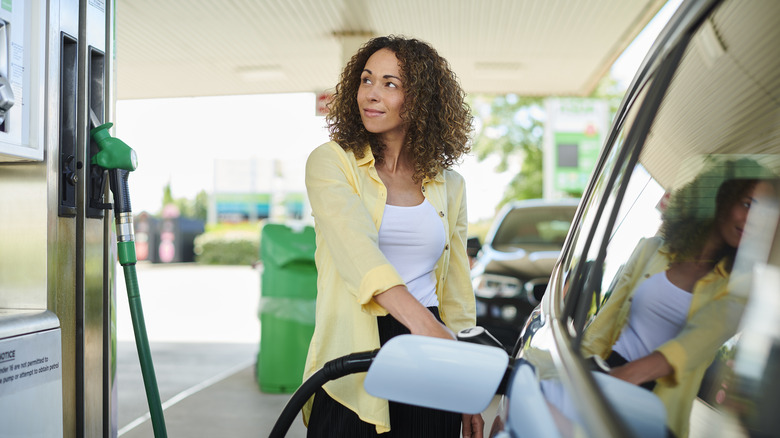Do You Need To Return A Rental Car With A Full Tank? Here's What To Know
When you have an upcoming road trip on the calendar, or you're getting ready to travel for business, there are many rental car options available. Often a convenient alternative to putting miles on a personal vehicle, rental cars are part of a booming industry. According to Enterprise Apps Today, over 602 million rental car users are anticipated by the year 2026.
Ibis World calculates consumers have 4,318 car rental business options across the U.S. in 2023. A customer satisfaction study by J.D. Power ranks Enterprise, National, and Alamo as the most popular picks. However, no matter what company you choose, the one constant is that each implements its own unique fuel policy.
It would be nice to assume the rules regarding fuel usage in rental cars are clear when you sign an agreement, but it's rarely the case. This makes it important to take time to review your specific rental agreement each time you choose a vehicle. Having a confident understanding of what's expected when it comes to filling up (or not filling up) the gas tank upon return can save you a lot of stress, time, and money.
If you're wondering whether you need to return your rental car with a full tank of gas, the answer is yes and no, depending on the company's specific policies. There are typically three different types of policies available. These include, generally speaking, a pay-in-advance option, an as-rented policy, or a full-fuel policy.
When you don't need to refuel upon return
If you don't want to have to worry about filling up the fuel tank when you return your rental car, you're going to want to make sure you rent with a company that offers a pay-in-advance option. Companies such as Enterprise and Hertz often refer to this option as a "prepay" policy while Alamo titles it as a "pay at the time of rental" option. Despite name differences, under the terms of this policy, customers will pay an upfront fee for gas when they sign their rental agreement. This amount accounts for the rental company committing to refueling the vehicle upon return.
Pay-in-advance eliminates any need to find a gas station before returning the car. It gives you the freedom to focus exclusively on calculating how much gas will cost while you're out on the road since you've paid ahead of time. You'll also have a full tank of gas when you pick up your vehicle.
The downside to this type of fuel policy is that the upfront cost can vary drastically. Oftentimes, the price for refueling the vehicle when it's returned is set by the rental company using the standard refueling rate in the region. However, there's really no way to predict that price point ahead of time or contradict the company's assessment. It's also important to keep in mind that if you go this route, you won't ever be refunded for the gas you leave in the tank.
When you do need to refuel upon return
There are a few scenarios where you will need to return your rental car with gas in the tank. The most common program using this approach is a full-fuel policy. Companies like Hertz refer to it as a "you refuel" option while Alamo categorizes it under their "pay upon return" plan.
A full-fuel policy means you'll sign a rental agreement promising to return the vehicle with a full tank of gas. Not to worry, you can expect your rental to come with a full tank of gas too. The cost advantage is that you aren't locked into a pre-set refueling rate. Instead, you can choose a gas station offering reasonable prices before returning the vehicle.
As-rented policy options are available at major car rental companies too. Enterprise calls it their "same fuel level" option while Hertz pairs it in with the "you refuel" plan. This policy gives drivers the choice to match the tank only to what it was when they picked it up.
Do keep in mind that if you misunderstand the required refueling level, there are added costs involved. Your rental car company may charge you for both what's missing and the costs associated with them having to refuel the vehicle themselves. You'll have the advantage of not having to refill the tank all the way but you also won't receive a refund if you happen to leave more gas in the tank than when you started out.


